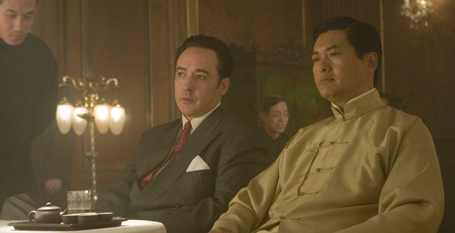Starting with The Good Earth and Broken Blossoms, Anglo and European directors have shared their fascinations with China and the Chinese through film. We haven’t had much respectable entries in this genre ever since Hollywood discovered Charlie Chan and Fu Manchu, but recently, there have been credible Hollywood-China productions such as The White Countess and The Painted Veil.
We gather that Mikael Håfström wishes to have his name added to the list. His ticket here is almost an adaptation of Casablanca, transplanted to Shanghai. The places and names have been changed, but the story is almost familiar. It is the eve of the bombing of Pearl Harbour, in a city which attracts all manner of foreign nationals from countries that are at war with each other. A cynical American outsider is brought into the picture.Yet on the other hand, the core of the story works well (faked passports in this version), which will be the focal point of some intrigue and nasty business amongst the locals and various spies and officials from an Allied embassy (Japan, in this case).
The outsider here is convincingly played by the under-appreciated John Cusack. Being a CIA spy, his character is more savvy than Bogart’s, but still less aware of the larger plot than he should be. I suppose that’s some kind of commentary by the director on America’s intelligence handling of 9/11. Like Bogart, he will be torn between love and duty when he meets his femme fatale – played here by Gong Li. For once, the actress with the theatrically heaving breasts is appropriately cast. She has reasons to be theatrical, as the leader of the resistance and unhappy wife of an unsuspecting gangland boss (played by Chow Yun-fat, of course) whom the Japanese top military man, diplomat and spy in Shanghai (Ken Watanabe) who executed her father, gives license to operate. And somewhere between all the tangled web of politics and intrigue are the letters of transit, the fake passports that will link each player in surprising ways.
I am in two minds about this film. On one hand, there is a certain element of stunt casting involved (basically all the principals aside from Cusack), which could just rub one up the wrong way. There is also the realisation that all adaptations and reworkings of Casablanca will always be doomed to be second-rate copies (remember the Sun Yat-sen biopic, Road to Dawn?). Yet on the more optimistic third hand, the core of the story works well because the script itself is inherently sound, John Cusack’s experience in recent noir films pay off here, and Håfström’s direction is solid and suffices.












 Printable Version
Printable Version












Reader's Comments
Be the first to leave a comment on this page!
Please log in to use this feature.